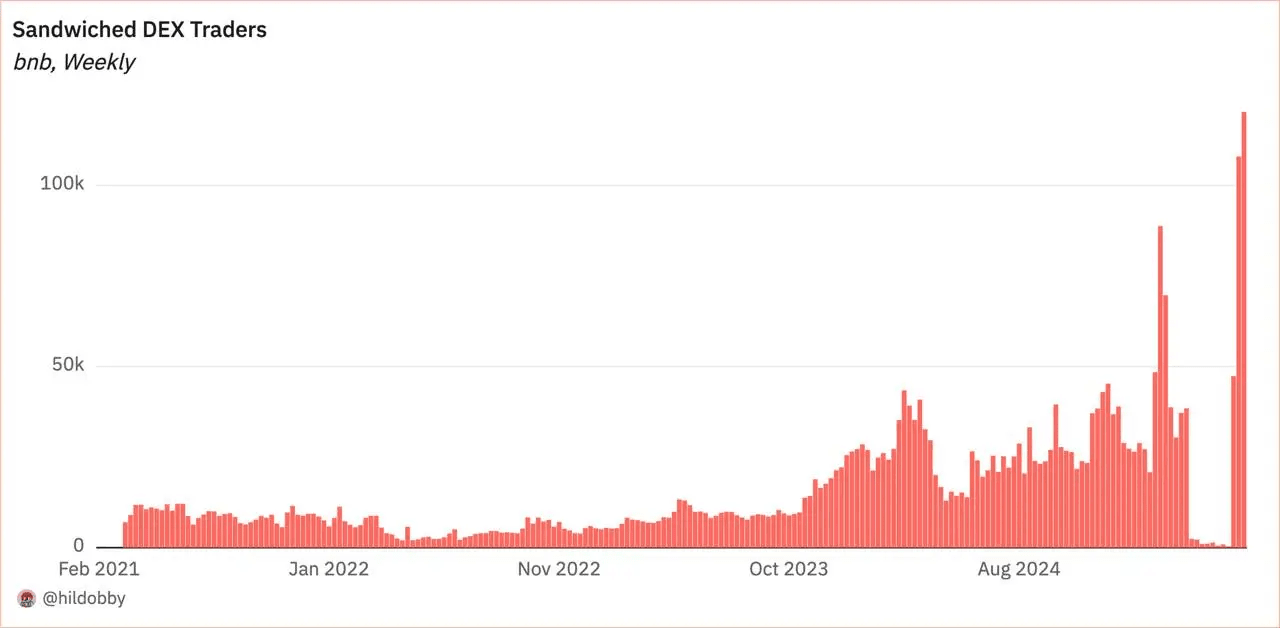Sandwich attacks on BNB Smart Chain (BSC) have increased, and this week alone more than 120,000 decentralized exchange (DEX) traders were affected. This resurgence coincides with a rise in network activity.
According to Dragonfly analyst Hildobby on X, there was a surge in sandwich attack activity in the network for the first time in mid-May, and this number continued to grow, especially in the last week of May and the first week of June. Data shows that the number of traders using DEX sandwich attacks exceeded 100,000 for two consecutive weeks, with trading volume exceeding 1 billion dollars.

120 thousand DEX traders fell victim to sandwich attacks on BSC in the first week of June (Source: hildobby)
Sandwich attacks are a form of market manipulation on the blockchain, where attackers front-run the victim's transactions by inserting their own trades before and after to profit from the victim's transaction. The attacker artificially inflates the token price by placing a buy order before the victim's transaction and then profits from the inflated price by placing a sell order immediately after the victim's transaction.
This issue has long been a serious challenge for decentralized exchanges, as attackers automate the process using Maximum Extracted Value (MEV) bots. Interestingly, the attack occurs due to the peculiarities of DEX infrastructure.
All submitted transactions enter the mempool, which is accessible to everyone, before miners choose which transactions to execute. Attackers can manipulate transactions by offering higher fees for miners to reorder transactions in their favor.
This issue has long existed on BSC: more than a third of the blocks on the network contained transactions affected by sandwich attacks on December 1, 2024. However, this is not characteristic only of BSC, as other networks such as Ethereum and Solana also face this problem. One address in 2024, Jaredfromsubway.eth, earned over 40 million dollars and a profit of 6.3 million dollars from sandwich attacks in less than three months.
BNB Chain has already faced sandwich attacks
However, earlier this year, BNB Chain already addressed this issue by introducing MEV protection for several wallets. At that time, the network stated that there are three solutions: automatic or manual MEV protection, or even individual protection for experienced users.
Automatic protection was available for some wallets, including Trust Wallet, Binance Wallet, OKX Wallet, TokenPocket Wallet, and SafePal, while other wallets could be configured manually. Apparently, this solution had worked before: from late March to early May 2025, the number of sandwich attacks significantly decreased. However, the situation seems to have worsened again.
Interestingly, this surge coincides with an increase in DEX transactions on BSC, with the network recording a huge volume of transactions. Dune data shows that in the first week of June, the network recorded 69 million transactions, while in the last week of May, it recorded 58.45 million transactions.
Interestingly, the impact of recent sandwich attacks is minimal, as they affected only a small percentage of transactions during these two weeks. In the first week of June, over 776,000 transactions were affected by sandwich attacks, while about 207,000 transactions were sandwich attacks. In the previous week, the total number of transactions related to sandwich attacks was only about 1 million.
What is even more surprising is that since early April, the number of sandwich bots on BSC has averaged less than 300 per week. This is a significant decrease from nearly 9,000 sandwich bots in mid-February.
BSC forecasts an increase in transaction volume
At the same time, the increase in transaction volume on BSC is linked to the Binance Alpha program, introduced on May 20. This initiative, which allows early users of Web3 projects to access tokens and airdrops, attracted a large number of new users to the network, resulting in a sharp increase in DEX volume.
According to Defillama, BSC was the leading network for DEX volume over the past 30 days with a figure of 147.18 billion dollars, far exceeding Solana, which ranks second with 79.31 billion dollars. The network also leads in daily volume with a figure of 3.63 billion dollars.

BSC outperforms Solana in meme coin activity (Source: Jason Yanowitz)
Interestingly, this also led to an increase in meme coin trading volume on Solana, showing how large-scale this program was. However, many observers believe that the trading volume is inflated due to wash trading, as users try to earn points through the Binance Alpha initiative.